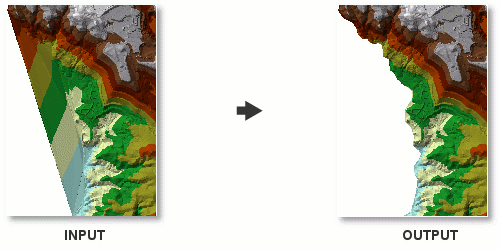摘要
基于三角形的边长度重新定义不规则三角网 (TIN) 的数据区或内插区。
插图

用法
此工具不会消除任何源数据。该工具通过将输入 TIN 的边进行重新分类为是否包含在插值区内来对其进行修改。如果希望保留要进行处理的 TIN 的未修改版本,请在运行该工具前考虑使用复制 TIN 工具创建副本数据集。
在边长分类开始之前,将对所有三角形边进行求值。这可有效撤消任何现有的数据区分类。如果从某一执行过程中获得的结果不尽如人意,则可在无需获得原始数据的情况下再次执行生成的 TIN。
通过此工具,可以从 TIN 的有效数据区中移除由 TIN 的源测量中的凹特征生成的极端边长。有一条边大于最大边长的三角形将被掩膜为 NoData 区域。
-
方法用于确定要计算的三角形。
语法
DelineateTinDataArea_3d (in_tin, max_edge_length, {method})| 参数 | 说明 | 数据类型 |
in_tin | 待处理的 TIN 数据集。 | TIN Layer |
max_edge_length | 用于在 TIN 数据区中定义 TIN 三角形边的最大长度的二维距离。如果三角形的一个或多个边大于此值,则会将其视为处于 TIN 插值区之外,并且不会在地图中进行渲染或用于表面分析。 | Double |
method (可选) | 描绘 TIN 数据区时将对 TIN 边进行求值。
| String |
代码实例
DelineateTinDataArea 示例 1(Python 窗口)
下面的示例演示了如何在 Python 窗口中使用此工具。
import arcpy
from arcpy import env
arcpy.CheckOutExtension("3D")
env.workspace = "C:/data"
arcpy.DelineateTinDataArea_3d("elevation", 10, "PERIMETER_ONLY")
DelineateTinDataArea 示例 2(独立脚本)
下面的示例演示了如何在独立 Python 脚本中使用此工具。
'''****************************************************************************
Name: Define Data Boundary of LAS File
Description: This script demonstrates how to delineate data boundaries of
LAS files with irregularly clustered points. It is intended for
use as a script tool with one input LAS file.
****************************************************************************'''
# Import system modules
import arcpy
import exceptions, sys, traceback
# Set local variables
inLas = arcpy.GetParameterAsText(0) #input LAS file
ptSpacing = arcpy.GetParameterAsText(1) # LAS point spacing
classCode = arcpy.GetParameterAsText(2) # List of integers
returnValue = arcpy.GetParameterAsText(3) # List of strings
outTin = arcpy.GetParameterAsText(4) # TIN created to delineate data area
outBoundary = arcpy.GetParameterAsText(5) # Polygon boundary file
try:
arcpy.CheckOutExtension("3D")
# Execute LASToMultipoint
arcpy.AddMessage("Creating multipoint features from LAS...")
lasMP = arcpy.CreateUniqueName('lasMultipoint', 'in_memory')
arcpy.ddd.LASToMultipoint(inLas, LasMP, ptSpacing, class_code,
"ANY_RETURNS", "", sr, inFormat, zfactor)
# Execute CreateTin
arcpy.AddMessage("Creating TIN dataset...")
arcpy.ddd.CreateTin(outTin, sr, "{0} Shape.Z masspoints"\
.format(lasMP), "Delaunay")
# Execute CopyTin
arcpy.AddMessage("Copying TIN to delineate data boundary...")
arcpy.ddd.CopyTin(outTin, "{0}_copy".format(outTin))
# Execute DelineateTinDataArea
arcpy.AddMessage("Delineating TIN boundary...")
maxEdge = ptSpacing * 4
arcpy.ddd.DelineateTinDataArea(outTin, maxEdge, "PERIMETER_ONLY")
# Execute TinDomain
arcpy.AddMessage("Exporting data area to polygon boundary...")
arcpy.ddd.TinDomain(outTin, outBoundary, "POLYGON")
arcpy.AddMessage("Finished")
arcpy.CheckInExtension("3D")
except arcpy.ExecuteError:
print arcpy.GetMessages()
except:
# Get the traceback object
tb = sys.exc_info()[2]
tbinfo = traceback.format_tb(tb)[0]
# Concatenate error information into message string
pymsg = 'PYTHON ERRORS:\nTraceback info:\n{0}\nError Info:\n{1}'\
.format(tbinfo, str(sys.exc_info()[1]))
msgs = 'ArcPy ERRORS:\n {0}\n'.format(arcpy.GetMessages(2))
# Return python error messages for script tool or Python Window
arcpy.AddError(pymsg)
arcpy.AddError(msgs)